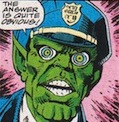|
Dr. Tough posted:I'm really not sure how grognards are going to "gatekeep" people out of the hobby. I have a really hard time imagining that a group of high school kids getting into RPGs are going to give a poo poo that some random people on the internet think that story games aren't real RPGs or whatever, assuming that they even have a chance to encounter those opinions in the first place. As an anecdotal counterpoint, I'm the player with the most experience in tabletop gaming playing in a new group with a first time DM and he made a point to explain to the table that "according to the internet" 5E was not a terrible set of rules like 4E. Character creation was done by following along a youtube tutorial. Modern youth are used to doing some basic research online. Doubly so for the self identified nerds and geeks that tabletop games limit their advertising to. The gaming habits of the old guard are going to be taught to the new generation. Given that the culture of the old guard is profoundly different from new players, there's going to be some bad advice transmitted. Hopefully it won't all stick.
|
|
|
|

|
| # ? Apr 29, 2024 08:43 |
|
Effectronica posted:Those people can't gatekeep their refrigerators, let alone a roleplaying game. It's easy to blame things on the damnable grognard, but it's also wrong. I don't exclusively mean intentionally - nerds are blackbelt masters of sending cues that YOU DON'T BELONG HERE. A prospective player might get ganged up on for interest in the "wrong" game, baffled by deliberately confusing ingroup jargon, cornered with appalling stories of "what goes on in my Chaotic Evil campaign," or any of a thousand other cat-piss first impression examples that would send a reasonable person walking and never looking back. If some miracle game showed up to revitalize the hobby into a second Golden age, it would first need to delouse the "community" to make it palatable to regular folks.
|
|
|
|
Evil Mastermind posted:It's a different situation nowadays because the main way people learn about stuff is via the internet. Someone interested in trying D&D is more likely to google "how do I learn D&D" or ask on Facebook than just go to a bookstore and grab the core books. This is why I bemoan the mediocrity of 5th Edition: someone goes on reddit, asks about getting started with D&D because they are really excited to try it, and they're met with undulating praise for 5E as a "really simple, fast-playing version of D&D" that's easy to learn. This is how gameplay is described in the Basic Rules PDF: quote:Does an adventurerís sword swing hurt a dragon or just bounce of its iron-hard scales? Will the ogre believe an outrageous bluff? Can a character swim across a raging river? Can a character avoid the main blast of a freball, or does he or she take full damage from the blaze? In cases where the outcome of an action is uncertain, the Dungeons & Dragons game relies on rolls of a 20-sided die, a d20, to determine success or failure. This is how 3rd Edition said it: quote:Dungeons & Dragons uses a core mechanic to resolve all actions in the game. This central game rule keeps play fast and intuitive. quote:All these actions depend on very basic, simple rules: Decide what you want your character to do and tell the Dungeon Master. The DM tells you to make a check and figures out your chance of success (a target number for the check). So while 5E isn't "stomp on your puppy" bad, really, the hobby deserves better.
|
|
|
|
Effectronica posted:There's a gigantic audience for TTRPGs and LARPs. First of all, there are a lot of people that identify as "nerdy" or "geeky" who thus have an academic interest in doing this geeky thing. There are a substantial number of people who already "roleplay" on blogs, imageblogs, twitter, etc. There are a number of people who would find it appealing if exposed to actual play. There are a number of people who engage in fantasizing in their day-to-day life, who could also be served by roleplaying. I've seen this sort of point raised going on a decade+ now. Nobody who's ever raised it has yet to explain exactly what this theoretical new-wave RPG poised to resonate with this wider audience ready to be served by it actually looks like. Until someone actually goes and proves otherwise, I remain unconvinced that it exists.
|
|
|
|
I've said it before, I'll say it again: D&D is the foundation stone of the hobby, the cornerstone that it's built on, the keystone that holds it up, and the millstone chained around its neck.
|
|
|
|
Kai Tave posted:Nobody who's ever raised it has yet to explain exactly what this theoretical new-wave RPG poised to resonate with this wider audience ready to be served by it actually looks like. It looked a lot like 4e D&D, unfortunately.
|
|
|
Halloween Jack posted:Semi-related: I can't remember his name, but there was a guy on the D&D design team who had come over from Magic, and the going assumption in the relevant thread was that he had been exiled. It was Tom LaPille, he was a magic dev. I have gamed with him on occasion, he's a little groggy sometimes, but a cool dude and good roleplayer overall, and he was transferred over by his own request. He left pretty quickly, I have never asked why, but it seems reasonably obvious. He recently left WotC to work on something else, though.
|
|
|
|
|
moths posted:It looked a lot like 4e D&D, unfortunately. As someone who really dug 4E I disagree. The sort of audience Effectronica is describing...people who roleplay on blogs, imageblogs, twitter, people who generically "engage in fantasizing," etc, aren't, I'm pretty comfortable in asserting, champing at the bit to play D&D4E, a game that requires a substantial investment in time, coordination, and is probably a bigger investment in "player commitment" than they're used to out of a game. I'm not saying these people are too stupid to grasp 4E or that 4E is some sprawling Champions-esque nightmare, simply that I don't believe the freeform social media roleplaying audience or the folks watching Wil Wheaton's Tabletop and thinking "huh, this Fiasco thing looks neat" are waiting to be served by an extensive fantasy adventure game with extensive tactical combat elements. D&D4E had pretty good exposure at the time too, it's not like it just slipped under the radar. The Penny Arcade guys giving it regular shoutouts and enthusing about it, running game events at PAX and such, that was a fairly significant signal boost reaching out to an audience that intersects with, but isn't dominated by, traditional tabletop roleplayers, and yet it doesn't seem to have ushered in some new-wave era of tabletop roleplaying, nor does it seem to have achieved anything noteworthy or prominent enough for WotC/Hasbro to have an issue with Mike Mearls throwing all of that in the dumpster to make D&D Next.
|
|
|
|
And that's why I didn't say the ideal game was 4E, but something along those lines. E: Clearly presented, accessible, and riding a tidal-wave of cultural Harry Potter / LotR relevancy. moths fucked around with this message at 19:07 on Jun 23, 2015 |
|
|
|
^^^e; okay, I'm still not convinced that would do it, but that's something.moths posted:And that's why I didn't say the ideal game was 4E, but something along those lines. Okay, but how? I'm not demanding that you pull a finished game out of thin air, but so what is it exactly that you're imagining along the lines of 4E that's poised to reach out to this wider, unserved audience waiting to elfgame?
|
|
|
|
I'm pretty sure that the consumer base of RPGs is much too fractured (not necessarily a bad thing!) for the hobby to have a 1980's TSR style dominance again. I'm also not really sure that 4E is the correct place to look for pointers on conducting this marketplace take over seeing that it was a commercial failure. Recall that it actually caused WotC's share of the market to decline. And no it wasn't because of a plot from evil grognards to keep new players from seeing the light.
|
|
|
|
Kai Tave posted:I don't believe the [...] the folks watching Wil Wheaton's Tabletop and thinking "huh, this Fiasco thing looks neat" are waiting to be served by an extensive fantasy adventure game with extensive tactical combat elements. I kind of have to agree with this. Years before I had really started on the hobby, I listened to the Critical Hit podcast, which was a D&D 4e campaign, and enjoyed it quite a bit. My exposure to the D&D video games and whatever bits and pieces I picked up from grogs.txt (yes I read the thread even when I wasn't actually playing TTRPGs, I'm broken) meant that I could follow along well enough, but there was always this feeling of "nah, that D&D thing is all arcane and complicated and I could never do that" in the back of my mind. So I just went along and whooped and cheered when I heard the group's Warlock roll a 20 and blast a dude for a bunch of Chaos damage, and I thought it was really cool that the Dragonborn Fighter could choose to attack the rafters holding up the silo and the DM knew how that would change the battle ("you could never do that in a WoW raid!"), but after the episode was done I'd put it away with the knowledge that I'd never get to do that myself. quote:Okay, but how? I'm not demanding that you pull a finished game out of thin air, but so what is it exactly that you're imagining along the lines of 4E that's poised to reach out to this wider, unserved audience waiting to elfgame? I think the way 4E was written and structured was a big help, acknowledging that yes, something with that much crunch might not have broad appeal. I get the same feeling reading 4E's books that I get with Dungeon World as far as they read like they were written with no preconceived notions, no hold-overs from being experienced with any previous RPGs.
|
|
|
|
Basically anything that's beginner-friendly instead of an extension of consumers' habits acquired over a lifetime. The rulebook looked and read clearly like a rulebook. Cool people like Penny Arcade were playing it and having fun. Online services made it easier and more familiar to new people. There were a lot of promo events, at least three "D&D Days." This was a deliberate effort to say "come in and play!" from a platform big enough to get people's attention. And gently caress if that didn't scare the worst elements of the hobby.
|
|
|
|
Dr. Tough posted:I'm pretty sure that the consumer base of RPGs is much too fractured (not necessarily a bad thing!) for the hobby to have a 1980's TSR style dominance again. I'm also not really sure that 4E is the correct place to look for pointers on conducting this marketplace take over seeing that it was a commercial failure. Recall that it actually caused WotC's share of the market to decline. And no it wasn't because of a plot from evil grognards to keep new players from seeing the light. [citation needed]
|
|
|
|
Dr. Tough posted:I'm pretty sure that the consumer base of RPGs is much too fractured (not necessarily a bad thing!) for the hobby to have a 1980's TSR style dominance again. I'm also not really sure that 4E is the correct place to look for pointers on conducting this marketplace take over seeing that it was a commercial failure. Recall that it actually caused WotC's share of the market to decline. And no it wasn't because of a plot from evil grognards to keep new players from seeing the light. 4E wasn't a commercial failure. If it had been, there wouldn't have been a slew of books for it, and there wouldn't have been a 5E. WOTC isn't in a rights-licensing situation where they need to crank out a lovely edition every X years or lose the rights to D&D, they could sit on it forever. But they felt there was some blood in that stone yet, Pathfinder or no Pathfinder. And yeah, it had some good stabs at accessibility and support for the system. WOTC's no-PDF policies remain absolutely baffling, along with a lot of their other decisions with the brand, but 4E by itself did not cause those things.
|
|
|
|
Kai Tave posted:[citation needed] It lasted six years and was outsold by Paizo's product. It was a commercial failure in that WotC went bankrupt or anything, but they did lose their dominate spot.
|
|
|
|
Kai Tave posted:[citation needed]
|
|
|
|
The number of DDI users forking over 15 (?) bucks a month for their subscription, which is a known value, would alone account for 4E being a significant financial success. Paizo's Pathfinder did eventually knock D&D out of the top spot, but it's important to note that it only started doing so after the release of Essentials, which was the point when the direction of the game (now helmed by one Mike Mearls) took a hard left towards bringing back the glory days of 3rd Edition D&D.
|
|
|
|
The closest thing we've ever heard to 4E having any kind of commercial issues wasn't "Failure." it was an an anecdotal "Didn't actually grow as fast as expected". This is an entirely different beast. It actually increased its market share! It just didn't increase it by enough. Also by that metric: D&D 3.0 lasted 3 years. 3.5 lasted 5 years. 4.0 lasted longer than either of the previous two editions.
|
|
|
|
I'm very curious about the economics of DDI vs. what they (and other companies) made from print sales, although I suppose the available data is extremely scant. I gave up on my DDI subscription when it became apparent that they just didn't care about it anymore.
|
|
|
|
Dr. Tough posted:It lasted six years and was outsold by Paizo's product. It must be great to just know the truth about things without having to bother with anything like verifiable facts or proof of any sort. Man, it's like I'm really back in 2012 all over again with people telling me that obviously 4E was a commercial failure because otherwise why would they be making a 5E, huh?
|
|
|
|
A drop in market share of a growing market is a failure only in the sense of failing to be maximally successful. And most of that failure can be ascribed to the emergence of a completely new competitor combined with some very serious missteps with the online and digital offerings. I personally dumped my D&D Insider account when they decided to cancel the (very good) desktop character builder (which I could easily put house rules into) in favor of an online-only webclient with less functionality. I was already annoyed by them taking years to never produce the other digital tools that had been promised at launch. D&D 4E is still selling, though. Did you guys know that? Even after the launch of 5th edition, you can still buy, new, 4E books? For that matter, WotC is still selling reprints of even older editions of D&D. I'm not aware of any other RPG that does that. Those reprints are selling well enough to justify the cost of producing them. There's a lot of reasons for why Paizo was able to gobble up at least half of D&D's market share but at least one of them stems from the much older bad decision of exactly how and why they created the open D20 licensing system. Paizo was able to launch a very large and fully fleshed-out RPG without having to actually spend the money it would have taken to develop it from scratch. They were able to leverage a chunk of market share instantly from the disaffected 3.5e players who hated 4E. I am of the opinion that 4E was a huge leap forward for D&D, but it was also remarkably divisive. Frankly I think the criticism there should't be "4E went too far in a weird direction" which alienated groggy D&D players, but rather, "4E didn't go far enough in a new direction" to make it wholly new and good. All of the parts of 4E that I dislike are parts that attempted to retain "traditional" 3e mechanics and tropes. OK, skill challenges also didn't work, and there were some problems with monster math that needed tweaking, but these things weren't that hard to fix. I'm talking more along the lines of, why do we still have ability scores? Why do we even have to have character classes, now that powers are cross-class balanced and everything is either a power or a feat? That kind of thing. After several years of not playing RPGs, I'm being roped into DMing 4E again by a friend of mine who wants to introduce his daughter to D&D. Going back and looking at it, I just kind of shrug. For tabletop tactical miniatures-based combat, I'm more excited by the boardgames I've kickstarted: Mantic's Dungeon Saga, and the upcoming Conan boardgame. Conversely for roleplaying I'm more excited by lightweight systems like PDQ and Fate Accelerated. That's just where my head is at, I don't pretend to know what exactly would give D&D broad appeal to Today's Youth, whom I am officially too old to be allowed to understand. I guess I'm just not sure what exactly would please folks who condemn D&D. Does a high-magic fantasy class-based crunchy combat RPG deserve to dominate all other RPGs? D&D is what started it all, so from a historical perspective it deserves credit for that. But why should more people want to play this particular style of elfgame, vs. SF, horror, low-magic fantasy, animes, giant robots, or whatever the hell else? Shouldn't "success" for D&D just be considered in that context? I think it's a shame that Pathfinder outsells D&D, but that's because I think Pathfinder (in as much as it's 3.5e D&D) sucks. Not because I think Paizo is inherently less deserving of success than Wizards of the Coast. I think if you define success as "is still selling products and making a profit off of them" - which is a claim hundreds of RPG game-makers of the last 30 years cannot claim - then D&D is still wildly successful. It's not the #1 game, it may never be the #1 game again, but it's still a healthy profitable product. I won't be playing 5th edition and I hope that somehow we get a 6th edition in a few years that actually moves things forward the way 4E did, but more so. But hell, at least people are still playing and enjoying Dungeons & Dragons. And even if some of the 5e design team are terrible people, I've got enough fondness for the franchise that I hope 5E doesn't ultimately kill it.
|
|
|
|
It's frequently asserted that Pathfinder outsells D&D and yet neither company puts out any sort of sales figures or releases any financial information except incidental scraps that people frantically attempt to extrapolate into some sort of concrete picture (ICv2 ratings, Amazon top whatever, number of people registered for the DDI subscribers-only forums, etc), which means that these assertions have about as much weight as someone saying that one game outsold the other because he personally doesn't know anyone who bought [GAME].
|
|
|
|
moths posted:E: Clearly presented, accessible, and riding a tidal-wave of cultural Harry Potter / LotR relevancy. So The One Ring, then?
|
|
|
|
Kai Tave posted:It must be great to just know the truth about things without having to bother with anything like verifiable facts or proof of any sort. Man, it's like I'm really back in 2012 all over again with people telling me that obviously 4E was a commercial failure because otherwise why would they be making a 5E, huh? Well here you go: http://icv2.com/articles/games/view/27068/top-5-rpgs-summer-2013 quote:The charts are based on interviews with retailers, distributors, and manufacturers.
|
|
|
|
When 4e released, a sentiment I saw repeated over and over was that WotC was personally rejecting 3e players as customers going forward. A childish sentiment, of course, but when Next began to supersede 4e, I noticed many things that indicated WotC really was willing to disregard the 4e fanbase in favour of trying to get Pathfinder and old edition fans back. Or maybe they just really misjudged how dissimilar 5e was from 4e. I don't have any data regarding how much of the 4e fanbase is playing 5e now, but almost everyone I played 4e with was discouraged. And some of us had been playing older editions, too, and now don't play D&D at all.
|
|
|
|
Dr. Tough posted:Well here you go: A snapshot from one point in 2013 is not total sales. Also ignores the impact of D&D insider as a primary revenue stream that represents what would otherwise probably be more sales of printed material (magazines, supplements, etc.). And extrapolations from interviews are not hard data.
|
|
|
|
Dr. Tough posted:Well here you go: I'm impressed that a website I've never heard of managed to get internal numbers from Amazon, the largest seller of books.
|
|
|
|
I think the bigger question is "why in the gently caress does it matter which game is selling better?" It's pretty safe to say 4e didn't lose money because it's D&D and thus will always sell, and Hasbro felt it was profitable enough to not just lock up the property and forget about it.
|
|
|
|
Dr. Tough posted:Well here you go: Which retailers? Which distributors? Which manufacturers? Which sources are these non-presented numbers compiled from? This is the same issue every time someone points to ICv2 like it's the word of god...where's this information coming from and how wide did they reach to compile it? There are, yet again, no loving citations to speak of. And assuming that somehow, through the power of faerie magic and wishful thinking, this chart is somehow completely telling the 100% full truthful story, in the summer of 2013 was smack-dab in the middle of D&D's "drought" between 4E and Next. I'm pretty sure, based on some cursory Google searches for 4E product release dates, that there weren't actually any 4E products released at all in 2013. So congratulations, Pathfinder managed to outsell D&D when D&D wasn't making anything, super impressive.
|
|
|
|
moths posted:It looked a lot like 4e D&D, unfortunately. As someone who is getting back into RPGs after two decades of absence, the seemingly huge emphasis 4ed has for minis and grids is a huge turnoff. Am I mistaken about this?
|
|
|
|
bunnielab posted:As someone who is getting back into RPGs after two decades of absence, the seemingly huge emphasis 4ed has for minis and grids is a huge turnoff. Am I mistaken about this? Well D&D3E had an equally significant emphasis on minis and a grid, it's just everyone convinced themselves that it didn't matter. edit; in the broader "does this matter to an audience that isn't already soaking in elfgames" mmmmmmaybe. I mean, "move pieces around on a grid/board" isn't some staggering complicated and offputting concept. It makes portability something of an issue...you can't just, for example, bust out Kemet wherever you want on a road trip or something, you probably would have the same issue with running a full-fledged 4E tactical combat...but plenty of people managed to play 3E D&D without a map or minis that I remain unconvinced that they couldn't do the same thing with 4E if they wanted to. Kai Tave fucked around with this message at 20:17 on Jun 23, 2015 |
|
|
|
Leperflesh posted:I am of the opinion that 4E was a huge leap forward for D&D, but it was also remarkably divisive. Frankly I think the criticism there should't be "4E went too far in a weird direction" which alienated groggy D&D players, but rather, "4E didn't go far enough in a new direction" to make it wholly new and good. All of the parts of 4E that I dislike are parts that attempted to retain "traditional" 3e mechanics and tropes. OK, skill challenges also didn't work, and there were some problems with monster math that needed tweaking, but these things weren't that hard to fix. I'm talking more along the lines of, why do we still have ability scores? Why do we even have to have character classes, now that powers are cross-class balanced and everything is either a power or a feat? That kind of thing. Somehow I've never seen this sort of analysis advanced before, and now that I have it's making a significant amount of sense. I never really liked what 4E made of D&D, but alternate systems like Dungeon World or whatever have much more appeal to me than 4E ended up having, and putting it in terms of 4E not being able to decide whether it was fish or fowl is something that could really help to explain that for me. I'd go a bit further and say that the setting, especially the cosmology, suffered from the exact same sort of problem. They came in with a CHANGE EVERYTHING attitude like you'd see being satirized by the character of a middle manager in a Dilbert cartoon, but they weren't actually willing to creatively cash the check that they'd written. So now the outer planes are planets or something but they still have to have all the same races and factions of outsiders shoehorned in because apparently players won't know what to do if they can't summon a So yeah, the idea that 4E was some sort of half-baked abomination (which is not to say you can't prefer it to 3E, but it would require that you hate 3E more than I did) makes increasingly more sense as I think about it.
|
|
|
|
Dr. Tough posted:Well here you go: I'm not surprised a game that released no books in 2013 didn't sell as well in 2013.
|
|
|
|
Dr. Tough posted:Well here you go: ICV2 numbers are notoriously completely meaningless. That's literally why people are complaining that neither Paizo nor WotC release numbers.
|
|
|
|
Well Paizo seemed to believe that they were outselling their rival because their CEO came out and said as much in 2011.
|
|
|
|
bunnielab posted:As someone who is getting back into RPGs after two decades of absence, the seemingly huge emphasis 4ed has for minis and grids is a huge turnoff. Am I mistaken about this? 1. D&D has always been about minis and grids, to the point where the AD&D rulebooks namedrop the TSR BATTLESYSTEM (TM) in the middle of a rules paragraph like it was Will Smith's Converse All-Stars. The trick was embracing the truth: with how much players engage in combat, the designers gave everyone tools to meaningfully engage with the combat mechanics all the time. 2. "4E was a good way to introduce RPGs to a new audience" was less about the fact that it was a tactical combat RPG and more about how it was written and how it was marketed.
|
|
|
|
Dr. Tough posted:Well Paizo seemed to believe that they were outselling their rival because their CEO came out and said as much in 2011. And as we all know, someone heavily invested in a company's image of success would never exaggerate or distort the truth for their own benefit, that would be wrong.
|
|
|
|
Dr. Tough posted:Well Paizo seemed to believe that they were outselling their rival because their CEO came out and said as much in 2011. I mean, Fate Core doesn't sell anywhere near as well as D&D or Pathfinder do, but that doesn't mean that Fate is an objectively worse game than D&D or PF, or that Fate Core isn't turning a profit.
|
|
|
|

|
| # ? Apr 29, 2024 08:43 |
|
Dr. Tough posted:Well here you go: Pathfinder out sold 4e for four nonconsecutive quarters starting three years from the release of 4e. Assuming ICv2 is reliable. This in the ~5 years both Pathfinder and 4e were commercially available and does not include the 4e launch.
|
|
|
























